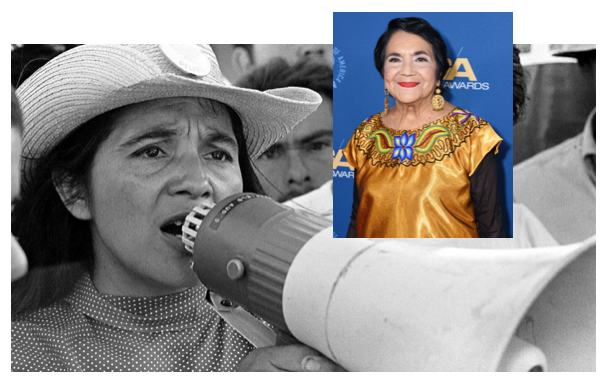CommentsGUEST COMMENTARY - This is dedicated to Dolores Huerta, civil rights activist and grande dame of the Californian labor movement, who will be 92 this Sunday, April 10. Feliz cumpleaños!
The union of the first thirteen states, and the subsequent entry into this union of those that followed is what created the United States and made it into the powerful country it became.
Unions of all sorts - from marriages to food cooperatives to labor – have a valuable place in today’s society.
While managerial and supervisory work has rarely been unionized, it still benefits from well-run unions that can facilitate collective bargaining, and act as credible intermediaries between administration and labor.
Union became a pejorative term during periods of corporatist ascendancy so many euphemisms came into use to allow necessary functions without being inflammatory. However, this has had the deleterious effect of splintering groups who should have power in acting with a united front.
In the past and present, unions have been a supportive force for their members and often an egalitarian element uniting workers in different spheres and ranks in pursuing common goals and good.
In earlier generations, these also formed as communities of both workers and their families to socialize and discuss the issues of their day, especially how decisions made by companies and government jurisdictions would affect them.
Union workers may make more money but they bring more to the table for the employer – skills, stability and loyalty – so long as the employer is loyal to the workers. Pride in their work is more important than blind adherence to a company’s logo, profits and executive pay.
Unions give working people a chance to work together on issues that are important to them including safety concerns, health issues and work-life balance.
In the age of Twitter and Facebook, of polarized “news” and religious extremism, unions can help cut through the online echo-chambers to address how issues relate to the concerns of their members, their families and their future.
When workers have a chance to talk, they better understand how they are being taken advantage of and can take action together.
When workers act in solidarity, both within their own union and in support of others facing the same disregard by management, they are strengthened by their numbers, their access to accurate information, and their ability to work in unison.
Fast food workers continue to organize with one McDonald’s employee pointing out that the recent trend to unionize is bigger than just individual companies and industries: “What happens to us and the workers at trillion-dollar corporations is going to set the standard for workers across the whole economy.”
Workers for other large low-wage employers are showing support for the Amazon warehouse workers and their families.
Amazon is the second largest corporate employer in the United States; WalMart is first and McDonald’s is third.
The recent vote by Amazon warehouse workers at a Staten Island, New York, facility known as JFK8 to establish a union may mark a turning point in moving back to time where employees’ rights matter. With 2,654 votes for and 2,131 votes opposed, this historic victory led by a fired employee puts the retail giant on notice that they can no longer continue to oppress their workforce with impunity.
This follows on a revote at Amazon’s BHM1 warehouse in Bessemer, Alabama when the National Labor Relations Board ordered a new election after determining that Amazon improperly interfered using a variety of tactics to intimidate employees into opposing unionization or not voting at all.
At this point unionization is losing by 118 votes. However, the final decision rests on 416 challenged ballots. And even if the revote loses, it is a win of sorts in that 71% opposed the union in the initial balloting.
Amazon has relied on high turnover to impede union organization, but that is exactly why these mammoth entities must be held accountable and their employees’ rights protected.
Workers at two more New York-area Amazon warehouses are now petitioning to form a union.
Another American mega-employer, Starbucks, has now had workers unionize at two New York locations leading employees in 54 stores in 19 states to pursue the similar recognition.
Fast food workers continue to organize and build cross-movement solidarity to fight for a world where everyone can work with dignity.
The ability of capital to control elections has accelerated in the United States in the wake of Citizens United and, more recently, with the addition of funds from both multinational and domestic companies with foreign investors trying to direct U.S. policies.
And not to the advantage of the American people.
Unions must also ensure that their elected and hired leaders reflect the interests of their members, and don’t abuse their positions by getting in bed with management or leveraging their authority for personal profit.
Given this is happening too frequently for comfort both here and abroad, all union members owe it to themselves and their sisters and brothers to take a personal interest in the actions of their leaders.
For Dolores Huerta, being a good union leader is all about doing what will benefit the workers, consistently acting on behalf of long-term needs for the unions and those they represent to continue strong.
(Liz Amsden is an activist from Northeast Los Angeles with opinions on much of what goes on in our lives. She has written extensively on the City's budget and services as well as her many other interests and passions. In her real life she works on budgets for film and television where fiction can rarely be as strange as the truth of living in today's world.)







